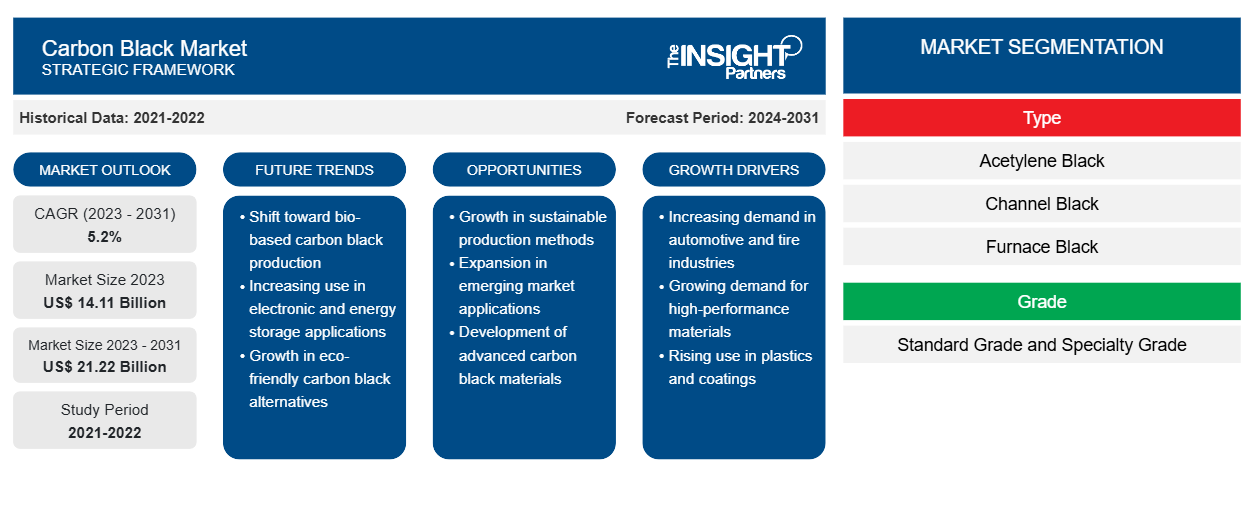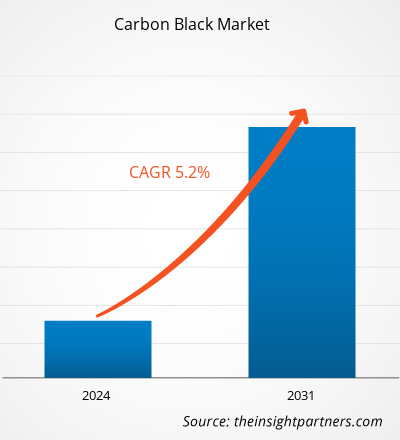Carbon Black Market Dynamics and Trends by 2031
Historic Data: 2021-2022 | Base Year: 2023 | Forecast Period: 2024-2031Carbon Black Market Size and Forecast (2021 - 2031), Global and Regional Share, Trend, and Growth Opportunity Analysis Report Coverage: By Type (Acetylene Black, Channel Black, Furnace Black, Thermal Black, and Others), Grade (Standard Grade and Specialty Grade), Application (Tire, Non-Tire Rubber, Plastics, Inks & Coatings, and Others), and Geography
- Report Date : Mar 2026
- Report Code : TIPRE00009517
- Category : Chemicals and Materials
- Status : Data Released
- Available Report Formats :


- No. of Pages : 150
The carbon black market is expected to reach US$ 22.87 billion by 2031 from US$ 14.92 billion in 2023, at a CAGR of 6.5% during the forecast period. The growing emphasis on waste tire management is likely to remain a key carbon black market trends.
Carbon Black Market Analysis
The growing demand from the automotive industry is mainly driving the market growth. Carbon black is highly used to manufacture reinforcing and pigment phases in automobile tires owing to its ability to increase the life of the tire by reducing thermal damage. Different materials used in manufacturing tires are considered a major factor in the safety and comfort aspects of automotive design. Carbon black is used as an additive in the rubber, which is used to manufacture tires that improve tensile strength and abrasion resistance. The carbon black market size is boosting rubber and automotive tire manufacturing, with the rising number of automobiles across the globe.
Carbon Black Market Overview
The particle size of carbon black affects the rubber and its color properties. Small diameters have higher surface area and higher tinting strength. Carbon black is highly used to strengthen rubber in tires. It can also act as a UV stabilizer, pigment, and conductive or insulating agent in a variety of plastic, rubber, ink, and coating applications. Moreover, carbon black is essential for various products which are used in many industries. Other applications of carbon black include hoses, conveyor belts, plastics, printing inks, and automotive coatings.
Customize This Report To Suit Your Requirement
You will get customization on any report - free of charge - including parts of this report, or country-level analysis, Excel Data pack, as well as avail great offers and discounts for start-ups & universities
Carbon Black Market: Strategic Insights

-
Get Top Key Market Trends of this report.This FREE sample will include data analysis, ranging from market trends to estimates and forecasts.
Carbon Black Market Drivers and Opportunities
Increasing Demand for Specialty Carbon Black
Specialty carbon black is the purest form of carbon black. It contains a low level of sulfur, metals, ash, and other impurities. It is made through the partial combustion of hydrocarbons, including oil and gas in order to meet rigorous specifications and deliver necessary functionality as per the end-use requirements. Specialty carbon black finds application as a reinforcing agent in belts, gaskets, vibration isolation devices, hoses, diaphragms, bushings, chassis bumpers, air springs, conveyor wheels, and grommets. In addition, it is also used in refuse sacks, industrial bags, photographic containers, agriculture mulch film, stretch wrap, thermoplastic molding applications for electrical/electronics, automotive, and blow-molded containers.
Rising Need for Green Alternatives
There is a rising need for green alternatives with a growing focus on sustainability. The green economy helps to promote economic development and improve people's lives while promoting environmental well-being. Green or recovered carbon black is emerging as an alternative to virgin carbon black manufactured from the combustion of crude oil. There are various benefits of carbon black recovered from recycled tires as it contributes to a significant decrease in CO2 emissions and also emphasizes reusing products to minimize waste generation. Thus, the rising need for green alternatives, such as green or recovered carbon black, is expected to offer more opportunities for market growth.
Carbon Black Market Report Segmentation Analysis
Key segments that contributed to the derivation of the carbon black market analysis are type, grade, and application.
- Based on type, the carbon black market is segmented into acetylene black, channel black, furnace black, thermal black, and others. The furnace black segment held a larger market share in 2023.
- By grade, the market is segmented into standard grade and specialty grade. The standard grade segment held the largest share of the carbon black market in 2023.
- In terms of application, the market is segmented into tire, non-tire rubber, plastics, inks & coatings, and others. The tire segment dominated the market in 2023.
Carbon Black Market Share Analysis by Geography
The geographic scope of the carbon black market report is mainly divided into five regions: North America, Asia Pacific, Europe, Middle East & Africa, and South & Central America.
Asia Pacific has dominated the carbon black market. In the Asia Pacific region, factors such as the growing automotive, coatings, and tire industry are mainly driving the market growth. The high disposable income of people in the region is resulting in increasing the demand for passenger and commercial vehicles, bolstering the need for automotive tires. In addition, the rising demand for EV vehicles in Asia Pacific and the increasing investments by leading automotive OEMs are propelling the market growth. Further, the growth of the tire industry in the region is attributed to the growth of the automotive industry in the region.
Carbon Black Market Regional Insights
The regional trends and factors influencing the Carbon Black Market throughout the forecast period have been thoroughly explained by the analysts at The Insight Partners. This section also discusses Carbon Black Market segments and geography across North America, Europe, Asia Pacific, Middle East and Africa, and South and Central America.
Carbon Black Market Report Scope
| Report Attribute | Details |
|---|---|
| Market size in 2023 | US$ 14.92 Billion |
| Market Size by 2031 | US$ 22.87 Billion |
| Global CAGR (2024 - 2031) | 6.5% |
| Historical Data | 2021-2022 |
| Forecast period | 2024-2031 |
| Segments Covered |
By Type
|
| Regions and Countries Covered |
North America
|
| Market leaders and key company profiles |
|
Carbon Black Market Players Density: Understanding Its Impact on Business Dynamics
The Carbon Black Market is growing rapidly, driven by increasing end-user demand due to factors such as evolving consumer preferences, technological advancements, and greater awareness of the product's benefits. As demand rises, businesses are expanding their offerings, innovating to meet consumer needs, and capitalizing on emerging trends, which further fuels market growth.

- Get the Carbon Black Market top key players overview
Carbon Black Market News and Recent Developments
The carbon black market is evaluated by gathering qualitative and quantitative data post primary and secondary research, which includes important corporate publications, association data, and databases. The following is a list of developments in the market for speech and language disorders and strategies:
- Cabot Corporation (NYSE: CBT) announced the launch of VULCAN 3-LP carbon black, a new low polycyclic aromatic hydrocarbon (PAH) product for rubber applications. VULCAN 3-LP carbon black is the fourth product in the Cabot LP carbon black series, providing customers with a full suite of carbon black products for use in applications that require controlled, very low PAH content, such as consumer rubber goods as well as food and potable water contact applications.(Source: Cabot Corporation, News Release/Company Website/October 2021)
- Birla Carbon, the leader in sustainable carbon solutions, announced the establishment of two new carbon black manufacturing sites in Naidupet, Andhra Pradesh, India, and Rayong, Thailand. (Source: Birla Carbon, Blogs/Company Website/January 2024)
Carbon Black Market Report Coverage and Deliverables
The “Carbon Black Market Size and Forecast (2021–2031)” report provides a detailed analysis of the market covering below areas:
- Market size and forecast at global, regional, and country levels for all the key market segments covered under the scope
- Market dynamics such as drivers, restraints, and key opportunities
- Key future trends
- Detailed Porter’s Five Forces and SWOT analysis
- Global and regional market analysis covering key market trends, major players, regulations, and recent market developments
- Industry landscape and competition analysis covering market concentration, heat map analysis, prominent players, and recent developments
- Detailed company profiles
Habi is a seasoned Market Research Analyst with 8 years of experience specializing in the Chemicals and Materials sector, with additional expertise in the Food & Beverages and Consumer Goods industries. He is a Chemical Engineer from Vishwakarma Institute of Technology (VIT) and has developed deep domain knowledge across industrial and specialty chemicals, paints and coatings, paper and packaging, lubricants, and consumer products. Habi’s core competencies include market sizing and forecasting, competitive benchmarking, trend analysis, client engagement, report writing, and team coordination—making him adept at delivering actionable insights and supporting strategic decision-making.
- Historical Analysis (2 Years), Base Year, Forecast (7 Years) with CAGR
- PEST and SWOT Analysis
- Market Size Value / Volume - Global, Regional, Country
- Industry and Competitive Landscape
- Excel Dataset
Testimonials
The Insight Partners' SCADA System Market report is comprehensive, with valuable insights on current trends and future forecasts. The team was highly professional, responsive, and supportive throughout. We are very satisfied and highly recommend their services.
RAN KEDEM Partner, Reali Technologies LTDsI requested a report on a very specific software market and the team produced the report in a few days. The information was very relevant and well presented. I then requested some changes and additions to the report. The team was again very responsive and I got the final report in less than a week.
JEAN-HERVE JENN Chairman, Future AnalyticaWe worked with The Insight Partners for an important market study and forecast. They gave us clear insights into opportunities and risks, which helped shape our plans. Their research was easy to use and based on solid data. It helped us make smart, confident decisions. We highly recommend them.
PIYUSH NAGPAL Sr. Vice President, High Beam GlobalThe Insight Partners delivered insightful, well-structured market research with strong domain expertise. Their team was professional and responsive throughout. The user-friendly website made accessing industry reports seamless. We highly recommend them for reliable, high-quality research services
YUKIHIKO ADACHI CEO, Deep Blue, LLC.This is the first time I have purchased a market report from The Insight Partners.While I was unsure at first, I visited their web site and felt more comfortable to take the risk and purchase a market report.I am completely satisfied with the quality of the report and customer service. I had several questions and comments with the initial report, but after a couple of dialogs over email with their analyst I believe I have a report that I can use as input to our strategic planning process.Thank you so much for taking the extra time and making this a positive experience.I will definitely recommend your service to others and you will be my first call when we need further market data.
JOHN SUZUKI President and Chief Executive Officer, Board Director, BK TechnologiesI wish to appreciate your support and the professionalism you displayed in the course of attending to my request for information regarding to infectious disease IVD market in Nigeria. I appreciate your patience, your guidance, and the fact that you were willing to offer a discount, which eventually made it possible for us to close a deal. I look forward to engaging The Insight Partners in the future, all thanks to the impression you have created in me as a result of this first encounter.
DR CHIJIOKE ONYIA MANAGING DIRECTOR, PineCrest Healthcare Ltd.Reason to Buy
- Informed Decision-Making
- Understanding Market Dynamics
- Competitive Analysis
- Identifying Emerging Markets
- Customer Insights
- Market Forecasts
- Risk Mitigation
- Boosting Operational Efficiency
- Strategic Planning
- Investment Justification
- Tracking Industry Innovations
- Aligning with Regulatory Trends




















 Get Free Sample For
Get Free Sample For